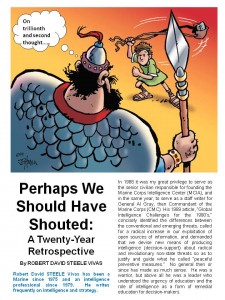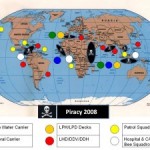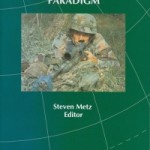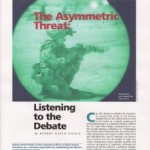A global study into 60 citizen journalism projects in 33 countries found citizen journalism flourished under governments which could be characterized as “soft authoritarianism” regimes such as in Malaysia and South Korea. Professor Michael Bromley from the University of Queensland School of Journalism and Communication told The Australian that citizen journalism flourishes “where there is room to comment and to intervene and to participate but there are strict rules: for example, the media is controlled by the state. That creates a need for it.” In repressive countries, such as Burma, there were fewer examples. Citizen journalists, Bromley said, “come out of a history that includes social activism. Bloggers and tweeters [users of micro-blogging site Twitter] can be citizen journalists but it's not just that independent personal view. It's about investigating, going to primary sources, offering your opinion. Often the blogger is the primary source.”
Journal: USNI/AFCEA Feature Stephen Carmel of Mersck Line Limited on Global Connectivity, Risk, Trade, and Security
02 China, 05 Energy, 10 Security, Commerce, Commercial Intelligence
Stephen Carmel is a world-class speaker with a truly compelling story to tell, and after learning about him from his appearance at the USNI/AFCEA Joint War Fighting Conference, we were deeply impressed.
Below we summarize the highlights from his speech, which we have put into a proper document with emphasis added throughout. This is one of the most useful intelligent commercial presentations to government we have every seen.
Highlights of his “prime” or most recent speech are below–although delivered in May, it did not hit critical mass in our circles until just now. Whatever “challenging tone” might be detected below is from Phi Beta Ioto–the speaker is a diplomat.
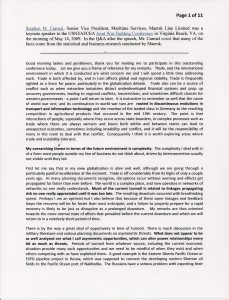
1) Complexity is the prime challenge. US Government is not trained, equipped, or organized to deal with complexity.
2) Global trade web has zero slack capacity and both the maritime and air webs depend in internal train and truck webs to keep going. US is $20 billion behind in the latter infrastructure.
3) Global trade web runs on computers and with the dependence on just in time inventory handling, has zero slack in the event of disruption, and the easiest as well as the most damaging disruptioin lies with computers and data that can be contaminated, manipulated, or simply destroyed.
4) USG completely missed China's deal with Russia to lock up the Siberian oil supply that is now bonded at the hip with the Chinese refining capacity that was part of the deal–this is a supply not subject to maritime interdiction.
Journal: No Record of DoD Responding to Congressional Mandate for Strategies, Plans, and Enhancements of the Separate Open Source Intelligence (OSINT) Discipline
History of Opposition, MilitaryIn the process of sorting through 20 years of documents pertaining to Open Source Intelligence (OSINT), all free to the public, we came across the original language from the Authorization Bill in 2006 that directed the Department of Defense (DoD) to respond with a report outlining how it would establish and enhance OSINT as a separate discipline, inclusive of strategies, plans, capabilities development and so on.
Lo and behold, it appears that DoD has not answered this requirement, which has been faxed to the Staff Directors of the Senate Select Committee on Intelligennce and the House Permanent Select Committee on Intelligence.
Follow the Frog to the 2006 posting of both the Congressional language and a short Defense News Daily report summarizing what the Authorizors want….

Journal: Agencies fail to make information sharing a priority
Government

By Jill R. Aitoro 07/30/2009
The Obama administration needs to restructure how interagency information-sharing initiatives are funded and implemented to encourage compliance by agencies that currently place a higher priority on their own missions, government and industry experts told House lawmakers Thursday.
“Differing missions, overlapping turf conflicts, resource constraints, bureaucratic inertia and agency tunnel vision still exist and impede information sharing,” said Ambassador Thomas McNamara, program manager of the Information Sharing Environment, a post within the Office of the Director of National Intelligence. ISE was created by Congress in 2004 to facilitate the sharing of terrorism information across all levels of government and the private sector.
. . . . . . .
The 2010 Intelligence Authorization Act, being debated in the House, includes a section that would move the ISE program manager position from the Office of the Director of National Intelligence to the Executive Office of the President, though President Obama stated that “such legislation is premature and could create undue administrative and managerial burdens by creating a completely new category of information for agencies to manage.”
+++++++Phi Beta Iota Editorial Comment+++++++
The Director of National Intelligence (DNI) means well, but this entire challenge of information sharing, like the challenge of global coverage, is about mind-set and culture. The secret world does not have it and never will. They have to be instructed and mandated and ultimately forced to give up half of their bloated budget that produces, “at best,” four percent of what the President needs to know and next to nothing at all for all of the substantive Congressional jurisdictions and the Cabinet officers they oversee.
Continue reading “Journal: Agencies fail to make information sharing a priority”
Journal: A Coup in Saudi Arabia Fails! Bandar Bush Gonzo
Government
Tip of the hat to Dr. Webster Tarpley, gifted historian and speaker of truth to power, for picking this up. We leave it to the reader to speculate about what role, if any, the U.S. Government played, and what might play out in the future as the indigenous peoples of Saudi Arabia find that they are power that cannot be suppressed.
+++++++Begin Story Extract+++++++
PakistaniDefence.com, 2 August 2009
Saudi Prince Bandar bin Sultan, the kingdom's former ambassador to the United States, is reportedly under house arrest over a conspiracy against the monarch.
Saad al-Faqih, head of the opposition group Islamic Reform Movement, told Arab-language TV al-Alam that Prince Bandar has been disappeared and the media has published no word from the ex-diplomat's whereabouts since nearly three months ago.
+++++++
Full Story Online, Click on Logo Above
Journal: Ralph Peters on Vietnam-istan
Military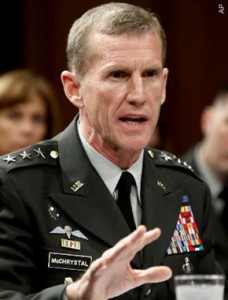
Tip of the hat to the New York Post, the primary outlet for Ralph Peters' syndicated column. Below the article is reproduced in its entirety for archival purposes and with permission of the author. Clicking on the photograph leads to the original article for as long as it remains available.
More Troops Aren't The Answer
New York Post
By Ralph Peters
OUR troops in Afghanistan are performing heroically, doing everything we ask of them. But we shouldn't ask them to die without a purpose.
We're floundering in Afghanistan — confusing techniques with strategy. Not one senior official, political or mi! litary, has explained convincingly why we're still there.
Only a few months ago, our “strategy” became the pacification of villages, providing security to the inhabitants and extending the writ of the government in Kabul.
But Afghans see their government as an enemy — a cabal of thieves grabbing all they can. We're fighting for an Afghan government that won't fight for itself or sacrifice to help its own people.
Our own officers don't trust the Kabul government. Why should Afghans believe us when we promote it? They know what they'll face — from both sides — when we leave.
Now RUMINT (“rumor intelligence,” the military term for insider scuttlebutt) has it that the new strategy isn't working and, instead of occupying rural hamlets, we'll shift to a newer new strategy of protecting major population centers.
On the plus side, that's what worked reasonably well for Afghanistan's medieval rulers, who concentrated on the ownersh! ip of cities and caravan routes.
On the down side, it never made Afghanistan a real country.
Worse, RUMINT also holds that our commander in Afghanistan, Gen. Stan McChrystal (a terrific soldier tasked with the impossible), may request additional American troops above the 21,000 already in the pipeline.
Their mission would be to buy time to build Afghanistan's security forces. Yet, after almost eight years of US efforts, the illiterate Afghans who Kabul press-ganged into uniform still perform abysmally (a few elite units notwithstanding). They don't believe in their government, either.
So our troops shoulder deadly burdens for a corrupt government that sides with the Taliban in the media to win votes from a hostile population. How, exactly, is this supposed to come out?
The echoes of Vietnam keep getting louder. Our well-intentioned aid only corrupts. We never pause to try to think like Afghans. And we comfort ourselves with platitudes, then lie about our prospects.
When political and milit! ary leaders don't know what to do, they send more troops, hoping things will magically work out. In Iraq, the surge was part of a comprehensive plan. In Afghanistan, though, another surge would be rubbing a rabbit's foot and crossing our fingers.
Meanwhile, Afghans in the countryside just wish we'd leave them alone (Vietnam redux). They don't know why we're there any more than we do.
What does this accomplish for our security? How does occupying a village in Helmand Province or even a major Afghan city deter al Qaeda's Arab leadership from its global jihad? Despicable as they are, the Taliban didn't attack our homeland.
We're fighting the wrong enemy, in the wrong place, in the wrong way. And sending more troops won't fix it.
The Taliban can't defeat us, but we can't win if we set ourselves absurd goals. Is an endless stalemate in a wasteland worth it?
We shouldn't evacuate Afghanistan entirely. It remains an excellent mother! ship for a smaller, hyper-lethal US force that would co ntinue to hunt and kill al Qaeda-affiliated terrorists in the back-country that straddles the border with Pakistan.
But the idea of building a modern Afghan state with a respected rule-of-law government is an impossible dream — and not worth the life of a single soldier, Marine or Navy corpsman.
Afghanistan isn't the heartland of terror. It's just the heart of darkness.
Readers of this column know I believe in killing our enemies wherever we can find them. But I don't believe in killing our own troops because our leaders duck fundamental questions.
During his election campaign, President Obama promised us that he knew how to fix Afghanistan. His macho rhetoric made it his war. But I'm willing to let him off the hook on that one — if we just stop pouring lives and money down a bottomless rat-hole. Concentrate on destroying our global enemies, not on teaching hygiene to Afghan hillbillies.
In the words Gen. ! David Petraeus applied to Iraq, “Tell me how this ends?”
It looks alarmingly as though the answer is “Vietnam.” I recently joked to a fellow military retiree that, if the parallels to the 1960s get any stronger, we might at least get some good music out of this mess.
I believe that Gen. McChrystal is doing his best. I'm convinced his subordinate officers are doing their best. And I know our troops are doing their best.
But for what?
Ralph Peters is Fox News' strategic analyst.
Journal: DoD Eyes Program Cuts To Fill $60B Shortfall
MilitaryAs the Pentagon prepares to bolster its counterinsurgency capabilities, the big winners appear to be light intratheater cargo planes, unmanned aerial vehicles, countermine warfare systems. Losers may include amphibious craft, heavy armored vehicles and air defense systems, according to defense officials and experts.
. . . . . . .
Unless DoD gets billions more from the White House, the money will be shifted from existing weapon programs to new irregular warfare tools, and to efforts to gird the Navy and Air Force to fight a major conventional war, Ochmanek said.
. . . . . . .
The Navy and Air Force will address “higher-end gaps” related to a major conventional war with a peer military.
+++++++Phi Beta Iota Editorial Comment+++++++
The profound ignorance of history and strategy within the most senior ranks of the Pentagon (i.e. the Policy and Acquisition elements ignoring Intelligence) is not surprising, but continues to disappoint.
$60 billion within a budget that is close to $1 trillion a year now is chump change. This is less than a 10% shift and comes under the heading of “cosmetics.” While the Air Force does indeed need redirection, both an increase in the C-130 and other innovative intra-threater delivery devices (e.g. geo-guided precision air drops), and the Air Force desperately needs a long-haul lift capability, the Air Force cannot be trusted to get this right as their leadership is currently oriented. Similarly, the Navy needs a 450-ship littoral Navy, a distributed Navy with many small platoforms able to execute the “pile-on” operational concept devised in 1992, but that is not where the Navy will spend the money–they are too busy justifying strategic nuclear submarines with five-foot wide tubes as their primary “Irregular Warfare” platform.
The Army Strategy Conference got it right in 1998–not only do we need to abandon the two theater concept (how very sad that it should take Versailles on the Potomac 21 years to catch up with the Army's Strategic Studies Institute)–but the Pentagon needs to understand the 1+iii (One Plus Triple Eye) concept advanced in 1998 and confirmed in 2008 at the Army Strategy Conference focused on Rebalancing the Instruments of National Power.
From where we sit (the cheap seats), the USA appears to lack a national strategy, a foreign affairs strategy, a military and military support to Whole of Government strategy, and a military acquisition strategy. Nothing has changed–just the specific words used to pay lip service to fad of the day, Irregular Warfare.
Historical References:
